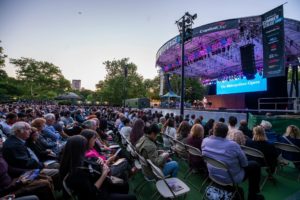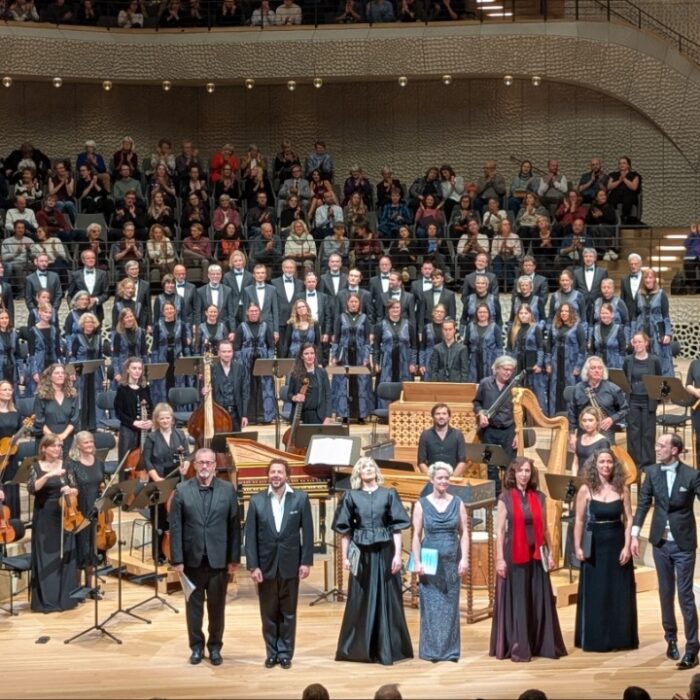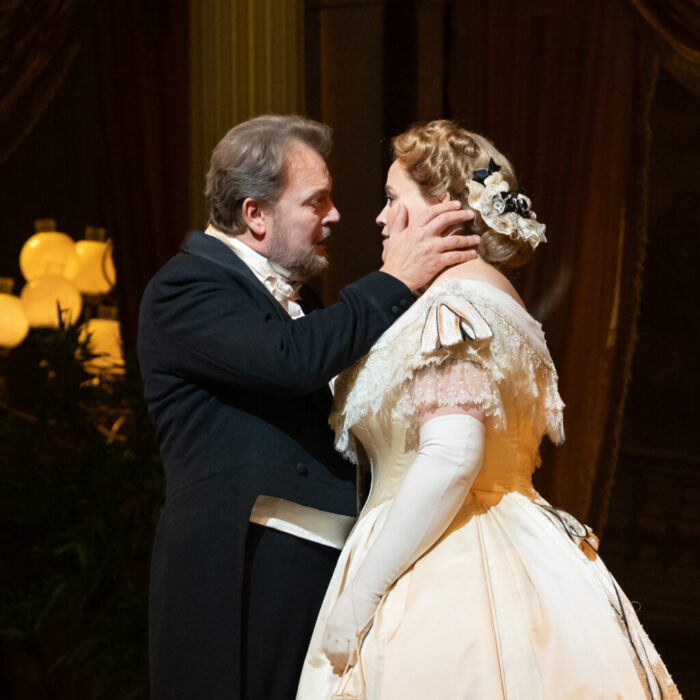
Metropolitan Opera Summer Recital Series 2018 Review – Hopkins, Chang, and Moore Put on a Splendid Evening of Outdoor Opera
By Logan MartellThe Metropolitan Opera’s Summer Recital Series started off on a high note on June 11, 2018. Audience members gathered in Central Park on a cool and cloudless evening that was filled with selections from operas both old and new, to be sung by some of the company’s most promising young talent.
Baritone Joshua Hopkins began the evening with “Largo al factotum” from Rossini’s “The Barber of Seville.” His rendition had no shortage of skill or humor, charming the audience from the get-go as he paired the pattering and vocal flourishes with spinning hips and almost-swaggering stances. A modern twist came when Hopkins pulled out his cellphone to answer a phone-call from someone seeking the popular barber. “Pronto,” Hopkins answered as both he and the music take a brief pause from the rapid tempo of the preceding section. His phone was soon flooded and Hopkins scrolled through the messages all asking for “Figaro, Figaro, Figaro…” etc. A people-pleaser through and through, the final “Figaro” saw Hopkins take a selfie for his fans before he launched into the aria’s climatic phrases and delivered a strong finish.
A Change of Pace
Two of Hopkins’ numbers drew upon the works of Richard Rodgers. The first was his duet with Latonia Moore, singing “If I Loved You” from the musical “Carousel.” Moore entered among the light quadruplets from the piano with a rather lofty phrasing to the opening verse, understandable given that she had just finished a stunning “Parigi, o cara” from “La Traviata.” Moore’s delivery highlighted the difficulties of love experienced by Julie Jordan, particularly in the phrase “words wouldn’t come in an easy way.” When Moore finished her part, the piano, rather than tapering into silence, began a descending melodic line to re-introduce the light quadruplets that began Hopkins’ part of the duet. His delivery of the verse carried a humorous fear of married life, as heard from the scornful emphasis he placed on “dude” in the phrase “I’d throw away my sweater, and dress up like a dude in a dickey, and a collar, and a tie…” While Julie Jordan and Billy Bigelow only sing their parts to one another, Moore and Hopkins, recapitulate in the middle of the chorus to sing together, trade a few phrases, and bring the conditional love song to a harmonious ending.
His second number was “Some Enchanted Evening,” from “South Pacific.” While this song is a favorite of basses ever since Ezio Pinza originated the role of Emile de Becque, as a baritone, Hopkins brought a youthful nuance to his rendition. Overall his tessitura was lighter, but he was more than able to delve into the lower notes without sounding forced. Hopkins illuminated the sensory nature of the lyrics “you may see a stranger… you may hear her laughing… when you feel her call you…” This youthful strength carried into the finish where the traditional pianissimo on “never let her go” instead sounded mezzo-forte.
More Traditional Path
Tenor Mario Chang’s first number, “Che gelida manina” from Puccini’s “La Bohème,” showcased his ability to be gentle as well as strong. His “chi son?” sounded like an invitation into the world of the starving poet, and his climactic “speranza!” bore a beautiful relish. His duet with Moore, “Parle-moi de ma mère,” from Bizet’s “Carmen,” saw him match the soprano’s sonorous heights; the innocent love of Michaela fittingly accented by the chirping of birds from the nearby trees. His acting matched his vocal technique in “Una furtive lagrima” from Donizetti’s “L’Elisir D’amore,” where he conveyed Nemorino’s shifting inner world, changing under the realization that his love is finally requited. An excellent contrast to his more tender numbers came after the intermission when he sang “Ella mi fu Rapita” from Verdi’s “Rigoletto.” Here Chang seethed in worried anger, but his hot blood soon cooled and gave the impression of a Duke who is genuinely in love with the missing Gilda.
When soprano Latonia Moore took to the stage, her “Song to the Moon” from Dvorak’s “Rusalka” was a dreamy invocation of love as Moore set her glimmering vocal colors to the sweeping arpeggios. This quality appears in further numbers such as “O mio babbino caro” from Puccini’s “Gianni Schicchi,” and certainly in “Ebben… ne andro lontana” from Catalani’s “La Wally.” Here Moore asserted both her love and her agency while sounding as delicate as the falling snow before the piano shifts into almost an avalanche of falling chords. Throughout the night, Moore made a splendid partner in her duets with Hopkins as well as Chang, showcasing her versatility within the operatic repertoire.
With stars such as these bringing operatic gems throughout the city, music lovers won’t want to miss the rest of the Summer Recital Series. This night’s program will be performed again on June 13, 2018 at Pier 1 of Brooklyn Bridge Park.


